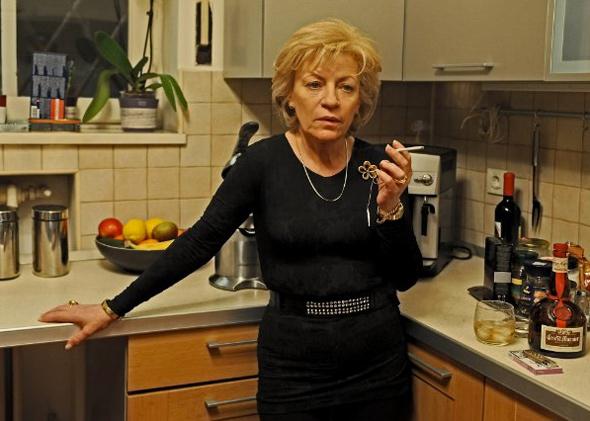The first thing you should know about Child’s Pose is that, despite the unfortunate choice of English title, this wrenching Romanian drama has nothing to do with yoga. The original title, Pozitia Copiluilui, refers to the literal physical position of a child—an image which might have several meanings in the movie’s context, none of them involving a relaxing forehead-to-floor asana. The central event of the film’s story is a tragedy (and, possibly, a crime) that the audience never witnesses: A thirtysomething man, Barbu (Bogdan Dumitrache) hits a 14-year-old boy with his car, killing him instantly. In the immediate aftermath of the accident, the driver’s mother, a wealthy, cultured architect named Cornelia (Luminita Gheorghiu) rushes to her son’s side to do whatever she needs to do to protect him—up to and including bribing witnesses, falsifying police reports, and pressuring the family of the dead boy not to press charges.
The second thing you should know about Child’s Pose—and the reason you should see it—is that it stars Luminita Gheorghiu, a veteran Romanian stage and film actress most familiar to Western audiences as the wily, tough, merciful nurse who was the only character in the 2005 satire The Death of Mr. Lazarescu to offer real comfort or help to the dying man of the title. Gheorghiu has been a prominent figure in the Romanian New Wave (a loose term for a distinctive style that’s emerged from that country over the past decade or so, characterized by naturalistic dialogue, fluid hand-held camerawork, and sharp political satire embedded in a context of kitchen-sink realism). Child’s Pose, which won the top prize at last year’s Berlin Film Festival, isn’t quite as brilliant a film all around as Cristi Puiu’s Lazarescu or Cristian Mungiu’s 2007 masterpiece 4 Months, 3 Weeks and 2 Days (in which Gheorghiu also appeared).* But it’s well worth seeing, both for its merciless anatomization of the country’s post-Ceausescu social order and for Gheorghiu’s stupendous central performance as a mother so monstrous she makes Medea look like a pushover.
Monstrous, but never simply villainous: Gheorghiu’s Cornelia is one of those maddening but unforgettable characters who, no matter how vile their behavior, you can’t bring yourself to hate. Early on, there’s a tough-to-watch scene in the waiting room of the police station where Cornelia’s son Barbu is being questioned the night of the accident. Cornelia and her officious sister-in-law (Natasa Raab) rush onto the scene in fur coats, ready to protest Barbu’s unjust treatment at the hands of the law—only to discover that the only other occupants of the waiting room are the immediate relatives of the dead child. Even as we’re disgusted by the women’s entitled behavior, we also perceive the black social comedy of the encounter: Cornelia is desperate to pull whatever strings she can to keep her boy out of jail, but also keenly aware of the need to appeal to the victim’s family’s good side by observing the outward protocols of grief and reconciliation (paying for the funeral, paying a condolence visit, etc.).
The director and co-screenwriter, Calin Peter Netzer, handles this kind of irony-rich social interaction with acute observational skill. In another standout scene later on, Cornelia sits down for a meeting with a witness to, and possible partial instigator of, the accident (a memorably unctuous Vlad Ivanov, who played the abortionist in 4 Months, 3 Weeks, 2 Days). As this grifting playboy shakes her down for the price of a drink, they edgily negotiate just how much he plans to charge her for whatever lie she needs him to tell, and we get a glimpse at a corroded social order in which everything, including truth and justice, is a potential commodity.
But Netzer seems less at ease in the scenes between Cornelia and her son, who, it’s implied in one queasy massage scene, have a seriously over-enmeshed Oedipal relationship. The multiple intense standoffs between the two of them never quite add up to a satisfying dramatic arc, and Barbu is depicted as so retiring and passive a character that his motives (unlike his meddlesome, needy mother’s) remain impalpable. In some scenes, Andrei Butica’s medium-shaky handheld camera does the ensemble cast a disservice by focusing a little too fixedly on Gheorghiu’s admittedly fascinating face. The whole point of handheld is that it can dart around a scene with the quickness of the human eye, showing you whatever you need to see—which isn’t always the diva in the center of the room, but sometimes the people watching the aria. Then again, Child’s Pose—whose title in Romanian might be more accurately translated as “fetal position”—is in large part a film about the terrifying, potentially destructive force of maternal love, so maybe it’s fitting that the camera is powerless to look away.
Correction, Feb. 21, 2014: This article previously misstated when Child’s Pose won at the Berlin Film Festival. It was last year, not this year. (Return.)
